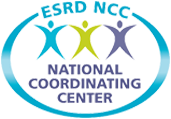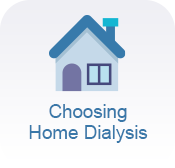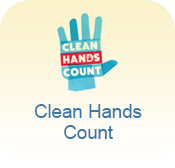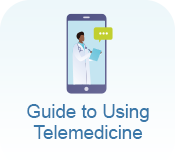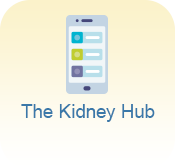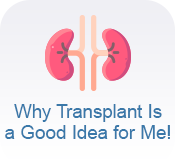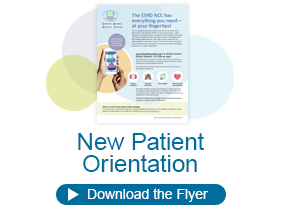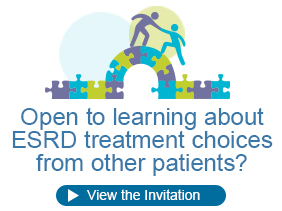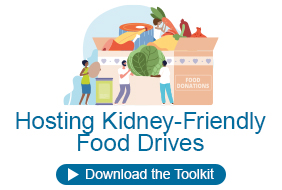Newly Diagnosed
- American Kidney Fund First 30 Program
- Be Prepared: Safe Hemodialysis Treatment Checklist
- Patient Rights & Responsibilities
- Questions to Get You Started
- Questions to Get You Started (Spanish)
Treatment Choices
- Dialysis Choices: Choosing the Right Options for You!
- Dialysis Choices: Choosing the Right Options for You! (Spanish)
- Kidney Failure: What are my treatment choices?
- Questions to Help with Your Treatment Choices
- Questions to Help With Your Treatment Choices (Spanish)
Access Planning and Care
- FFCL: Hemodialysis Vascular Access
- FFCL: Hemodialysis Vascular Access (Spanish)
- Let’s Talk: Questions or Concerns about a Permanent Access?
- Lifeline for a Lifetime: Planning for Your Vascular Access
Staying Healthy
- Guide to A Healthier You
- Guide to a Healthier You (Spanish)
- Guide to a Healthier You (Audio)
- Tips for Staying Healthy Outside of the Dialysis Clinic
- Tips for Staying Healthy Outside of the Dialysis Clinic (Spanish)
- Your Fluid Intake Matters!
- Your Fluid Intake Matters! (Spanish)
Being Involved In Your Care
- 10 Tips to Getting More Involved in Your Care
- Hospital Discharge Checklist
- Hospital Discharge Checklist (Spanish)
- Hospital Discharge Checklist—Newly Diagnosed Renal Patients
- Hospital Discharge Checklist—Newly Diagnosed Renal Patients (Spanish)
- My Plan, My Care
- My Plan, My Care (Spanish)
- Because Your Voice Matters
- Because Your Voice Matters (Spanish)
- Because Your Voice Matters (Audio)
- Creating a Life Plan
- Creating a Life Plan (Spanish)
- Creating a Life Plan (Large Print)
- Part 2: Implementing a Life Plan
- Part 2: Implementing a Life Plan (Spanish)
- Part 2: Implementing a Life Plan (Large Print)
- Part 3: Staying on Track With Your Life Plan
- Part 3: Staying on Track With Your Life Plan (Spanish)
- Part 3: Staying on Track With Your Life Plan (Large Print)
- Understanding and Participating in QAPI
- Understanding and Participating in QAPI (Spanish)
- Understanding and Participating in QAPI (Large Print)
- Part 2: Overcoming Barriers to Attending QAPI Meetings
- Part 2: Overcoming Barriers to Attending QAPI Meetings (Spanish)
- Part 2: Overcoming Barriers to Attending QAPI Meetings (Large Print)
- Part 3: Improving Quality Outcomes: Patients' Experience
- Part 3: Improving Quality Outcomes: Patients' Experience (Spanish)
- Part 3: Improving Quality Outcomes: Patients' Experience (Large Print)
Traveling on Dialysis
- My Dialysis Travel Checklist
- My Dialysis Travel Checklist (Spanish)
- My Home Dialysis Travel Checklist
- My Home Dialysis Travel Checklist (Spanish)
Medicare Information
Infection Prevention
- Pledge for Clean Hands In-Center
- Pledge for Clean Hands In-Center (Spanish)
- Pledge for Clean Hands In-Center (Audio)
- Pledge for Clean Hands In Your Home
- Pledge for Clean Hands In Your Home (Spanish)
- Maintaining the Immune System
- Maintaining the Immune System (Spanish)
- Kidney Transplant: Tackling Transplant Infections
- Kidney Transplant: Tackling Transplant Infections (Spanish)
- Preventing Peritonitis: Peritonitis Symptoms, Treatment, Prevention
- Preventing Peritonitis: Peritonitis Symptoms, Treatment, Prevention (Spanish)
- Test Your Hand Hygiene Knowledge Tutorial
- Clean Hands Count
- Conversation Starter to Prevent Infection in Dialysis Patients
- How Do you Get an Infection?
- Your Infection Prevention Guide
Vascular Access
- Catheter Check Guide
- Check Catheter Guide (Spanish)
- Monitoring Your Vascular Access
- Monitoring Your Vascular Access (Spanish)
- “Ready, Set, Go” New Fistula Dialysis Check: Weeks 1–2
- “Ready, Set, Go” New Fistula Dialysis Check: Week 3
- “Ready, Set, Go” New Fistula Dialysis Check: Weeks 4-5
- “Ready, Set, Go” New Fistula Dialysis Check: Weeks 6–10
- “Ready, Set, Go” New Graft Dialysis Check: Week 1
- “Ready, Set, Go” New Graft Dialysis Check: Weeks 2–3
- “Ready, Set, Go” New Graft Dialysis Check: Week 4
- Dos and Don’ts: How to Keep Your Vascular Access Healthy
- Considering Home Dialysis
- Considering Home Dialysis (Spanish)
- Choosing Home Dialysis
- Choosing Home Dialysis (Spanish)
- My Home Dialysis Checklist
- My Home Dialysis Checklist (Spanish)
- Let’s Talk: Home Dialysis
- Uncovering Myths About Home Dialysis
- Options for Dialyzing at Home
- Options for Dialyzing at Home (Spanish)
- Know the Facts About Home Dialysis Choices
- Know the Facts About Home Dialysis Choices (Spanish)
- Treatment Options: Peritoneal Dialysis
- Treatment Options: Peritoneal Dialysis (Spanish)
- Treatment Options: Peritoneal Dialysis (Audio)
- Home Dialysis May Be the Right Option for You (Audio)
- Be Heard: Tips for Talking with Your Care Team
- Be Heard: Tips for Talking with Your Care Team (Spanish)
- Be Heard: Tips for Talking with Your Care Team (Audio)
- Goal Setting: Getting Back to Me
- Dialysis Patient Depression Toolkit
- Health Status Release Form
- Questions for Better Health
- Starting Your Journal
- Starting Your Caregiver Journal
- Motivational Patient Stories
- Planning for a Kidney Transplant
- Planning for a Kidney Transplant (Spanish)
- Preparing for a Kidney Transplant
- Preparing for a Kidney Transplant (Spanish)
- Kidney Transplant: Protecting Your Kidney From Infection
- Kidney Transplant: Protecting Your Kidney From Infection (Spanish)
- Kidney Transplant: Tackling Transplant Infections
- Kidney Transplant: Tackling Transplant Infections (Spanish)
- Get the Facts: Kidney Transplantation
- Get the Facts: Kidney Transplantation (Spanish)
- Partnering Along the Road to Transplant (English)
- Partnering Along the Road to Transplant (Spanish)
- Why Transplant Is a Good Idea for Me!
- Why Transplant Is a Good Idea for Me! (Spanish)
- Is a Kidney Transplant Right for Me?
- The Road to Transplant
- The Road to Transplant (Spanish)
- Your Life Your Choice: Stories from Kidney Transplant Patients and Donors
Transplant 101 Series
- What Is a Kidney Transplant?
- What Is a Kidney Transplant? (Spanish)
- What is a Kidney Transplant (Audio)
- What Is a Kidney Transplant Center?
- What Is a Kidney Transplant Center? (Spanish)
- Meet the Members of the Transplant Team
- Meet the Members of the Transplant Team (Spanish)
- Meet the Members of the Transplant Team (Audio)
- Types of Kidney Donors
- Types of Kidney Donors (Spanish)
- The Kidney Transplant Surgery
- The Kidney Transplant Surgery (Spanish)
- Post-Transplant Kidney Diet
- Post-Transplant Kidney Diet (Spanish)
- How Much Does a Kidney Transplant Cost?
- How Much Does a Kidney Transplant Cost? (Spanish)
- Be Prepared for an Emergency or Natural Disaster
- ESRD Patient Emergency Planning Checklist
- Preparing for Emergencies: A Guide for People on Dialysis
- Patient Emergency Contact List
- KCER: Three-Day Emergency Diet
- KCER: Three-Day Emergency Diet (Spanish)
- Emergency Disconnect Procedure for In-Center Hemodialysis Patients
- Emergency Disconnect Procedure for In-Center Hemodialysis Patients (Spanish)
The ESRD Networks work with kidney patients, dialysis, and transplant centers to improve the quality of care to assist your patients in getting right care at the right time. There are 18 ESRD Networks that are responsible for each U.S. state, territory, and the District of Columbia—see the Overview. One of the main duties of the Networks is to help the Centers for Medicare & Medicaid Services (CMS) understand the needs of dialysis patients. Find your ESRD Network by clicking on your state on this map.
Here are several organizations with which the ESRD Networks regularly collaborate:
- Patient Support Group (from the American Association of Kidney Patients [AAKP])
- Peer Mentoring (from the ESRD NCC)
- National Kidney Foundation
- American Association of Kidney Patients
- Understanding Depression in Kidney Disease (from the AAKP)
- Renal Support Network
- National Living Donor Assistance
- My Kidney Life Plan: My Dialysis Choice
- Kidney School—Living Successfully with Kidney Disease
- Home Dialyzors United
- Alliance for Home Dialysis
- Forum of ESRD Networks Patient Resource page
Health Literacy Dictionary
According to the Centers for Disease Control and Prevention, health literacy is the degree to which individuals have the ability to find, understand, and use information and services to inform health-related decisions and actions for themselves and others. This dictionary is intended to provide simple definitions of key terms and is focused on terms related to patient care for End Stage Renal Disease (ESRD). The dictionary is arranged in alphabetical order.
Access for Dialysis: A means to get into the body. There are three types of accesses to the bloodstream for dialysis: a fistula, a graft, or a catheter.
Acute Renal Failure: A temporary condition where the kidneys SUDDENLY become unable to remove waste products and extra fluid from your blood.
Adequacy: A term that tells you how well dialysis is working. The adequacy test tells you if enough waste products and fluid are removed from your body.
Anti-rejection Medicine: A combination of medicines used to prevent your body’s immune system from attacking your transplanted kidney.
Bivalent Booster: COVID vaccine booster that protects against both the original COVID-19 virus and the Omicron variant BA.4 and BA.5.
Blood Glucose: Blood glucose is found in the blood. It is the main source of energy from things that you eat and drink. Blood glucose is also known as blood sugar.
Blood Glucose Level: The amount of glucose in your blood at a specific time. Blood glucose is also known as blood sugar level.
Blood Glucose Meter: A small portable machine used by people with diabetes to check their blood glucose levels.
Blood Pressure: Blood pressure is the force, or pressure that makes the blood flow around or through the body. Blood pressure is often shortened to “BP.”
Blood Type: There are four blood types: Blood types A, B, AB, and O. Except for type O, your blood type is either positive or negative. For example, AB+ or B-. Knowing your blood type is important. Talk with your doctor about your specific blood type.
Brain Fog: Not being able to focus, memory issues, and general confusion that some dialysis patients may experience. Talk with your doctor if you are experiencing these symptoms.
Central Venous Catheter (CVC): A small tube placed in your chest for hemodialysis.
Chest Catheter: A temporary catheter that is inserted in a large vessel in your chest to access your blood for dialysis.
Chronic Kidney Disease: Kidney disease that develops slowly over a long period of time, also known as CKD.
Continuous Ambulatory Peritoneal Dialysis (CAPD): A form of dialysis in which your stomach is filled with a special fluid (dialysate) and then removed through the tube. This is called an exchange. The fluid removed is called waste. To get rid of the waste, you need to do an exchange every four to six hours while you are awake.
Continuous Cycler Peritoneal Dialysis (CCPD): A form of dialysis that uses a cycler machine to fill your stomach with fluid and drain the waste during the night while you sleep.
COVID-19: A highly contagious respiratory infection that may have symptoms of fever, chill, cough, shortness of breath, feeling tired, muscle aches, headache, loss of taste and smell, sore throat, congestion or runny nose, vomiting, and/or diarrhea. Take a home COVID test or get tested to verify if you have COVID-19. If you test positive, or your symptoms worsen, contact your doctor.
Deceased Donor: A deceased donor is a person who has died and agreed to donate their kidneys to another person).
Delayed Graft Function: A transplanted kidney (graft) that does not work right away. Patients may need to dialyze for a short period until the new kidney starts to work properly.
Dialyzer: This is a filter that removes body waste and extra water from the blood like a normal kidney.
Diabetes: High blood sugar resulting from the body not being able to use sugar (glucose) as needed. In type 1 diabetes, the body does not make insulin; in type 2 diabetes, the body does not use insulin properly.
Femoral Catheter: A temporary catheter that is placed in a large vessel in your upper thigh (femoral vessel) to access your blood for dialysis.
Filter: Another name for the dialyzer. The filter (dialyzer) removes body waste and extra water from the blood like a normal kidney.
Fistula: A surgeon will join an artery and a vein together. This will make your access strong enough for dialysis.
Graft: A surgeon will connect a small plastic tube to an artery and a vein. This will make your access strong enough for dialysis.
Insulin: With each meal, insulin is released from the blood cells, and it helps the body use or store the blood glucose (blood sugar) it gets from food.
Jugular Catheter: A temporary catheter that is placed in a large vessel in your neck (jugular) to access your blood for dialysis.
Kidneys: The two bean-shaped organs that are in the middle of your back. The kidneys remove waste from your blood. The kidneys also make urine, which is sent to your bladder through tubes called ureters to be removed from your body.
Kidney Failure: When the kidneys permanently lose the ability to remove waste and extra fluid from the blood. Also known as End Stage Kidney Disease.
Kidney Transplant: A kidney is removed from one person (donor) and given to another person (recipient). The transplanted kidney can come from a deceased donor or a living donor.
Kidney Transplant Rejection: When the body’s immune system attacks the transplanted kidney. Your doctor will prescribe anti-rejection medicine to protect your new kidney.
Living Donor: A person who donates a kidney to another person.
Medicare: Medicare is health insurance for people aged 65 or older. You may qualify for Medicare 3 months before you turn 65 years old. You may also qualify for Medicare, regardless of your age, if you have a disability, or have End Stage Kidney Disease. Get started with Medicare | Medicare
Medicaid: Medicaid is health insurance for adults who have low income, children, pregnant women, elderly adults, and people with disabilities. Medicaid is state-based insurance. Medicaid
Nephrologist: A doctor who specializes in kidney care.
Pancreas: An organ that makes insulin to help digest your food. The pancreas is about the size of your hand and is located behind the lower part of the stomach.
Peritoneal Dialysis Catheter (PD Catheter): A special tube that is placed in your stomach for fluid exchanges during dialysis.
Recipient: A person who receives an organ from another person.
Transplant Evaluation: An ongoing, usually annually, series of medical tests, procedures, and meetings with the transplant team to ensure that you are healthy enough to receive a kidney transplant. Some procedures may include a mammogram, colonoscopy, and dental exam.
Urea: Urea is the waste product from food that builds up in your blood when your kidneys stop working.
Urine: The liquid waste products and extra water that is removed by the kidneys.
